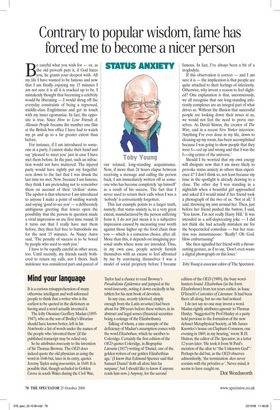Mind your language
It is a curious misapprehension of many otherwise intelligent and well-informed people to think that a writer who is the earliest to be quoted in the dictionary as having used a word actually invented it.
The lofty Oxonian Geoffrey Madan (18951947), who as the son of Bodley’s librarian should have known better, left in his Notebooks a list of words under the names of the people who ‘invented them’ (if the published transcript may be relied on).
So he attributes insecurity to the invention of Sir Thomas Browne. The OED does indeed quote the old physician as using the word in 1646 but, later in its entry, quotes Jeremy Taylor using insecurities, in 1649. It is possible that, though secluded in Golden Grove in south Wales during the Civil War, Taylor had a chance to read Browne’s Pseudodoxia Epidemica and jumped at the word insecurity, noting it down excitedly in his tablets for his next book of devotion.
In any case, security (derived, simply enough from the Latin securitas) had been about for 200 years before these writers, in its abstract and legal senses (financial securities being a coinage of the Elizabethans).
Talking of whom, a nice example of the deficiency of Madan’s assumption comes with the word Elizabethan, which he ascribes to Coleridge. Certainly the first edition of the OED quotes Coleridge, in Biographia Literaria (1817) writing of ‘Daniel, one of the golden writers of our golden Elizabethian age.’ (I know that Edmund Spenser said that Samuel Daniel ‘doth all afore him far surpasse’, but I should like to know if anyone reads him now.) Anyway, for the second edition of the OED (1989), the busy wordhunters found Elizabethan (in the form Elizabethean) from ten years earlier, in Isaac D’Israeli’s Curiosities of Literature. It had been there all along, but no one had noticed.
I do not say no one may invent a word. Madan rightly attributes agnostic to Thomas Huxley. ‘Suggested by Prof Huxley at a party held previous to the formation of the now defunct Metaphysical Society, at Mr James Knowles’s house on Clapham Common, one evening in 1869, in my hearing,’ wrote R.H. Hutton, the editor of The Spectator, in a letter 12 years later. ‘He took it from St Paul’s mention of the altar to “the Unknown God”.’ Perhaps he did but, as the OED observes admonitorily, ‘the termination -ikos never coexists with the privative a-’. Never mind, it seems to have caught on. Dot Wordsworth


















































































 Previous page
Previous page